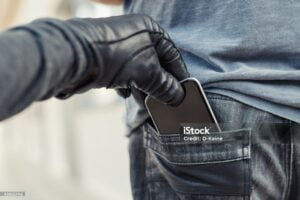One Saturday morning in April, Akara Etteh was walking out of Holborn tube station in central London, casually checking his phone. In a split second, a thief riding an electric bike grabbed the phone from his hand and sped away. Akara chased after them, but they quickly disappeared into the distance.

Akara’s case is just one of around 78,000 “snatch thefts” reported in England and Wales in the past year, marking a sharp increase. Despite the rising numbers, the chances of catching these thieves are slim. The police are focused on targeting the criminals, but they admit they can’t solve this issue by just making arrests. They also believe phone manufacturers need to step up to help prevent these crimes.
For Akara and many other victims, losing a phone isn’t just about the cost—it’s about losing personal memories, photos, and in some cases, even large amounts of money.
Tracking the Stolen Phone
After the theft, Akara put his iPhone 13 in “lost mode” so the thieves couldn’t access his data. He used his laptop to activate the “Find My iPhone” feature and began tracking its location. At first, he saw it was still in London, moving around north London neighborhoods like Islington.
Fueled by frustration and anger, Akara decided to go to some of the locations where his phone had been. He admits now that it was a risky move, but at the time, he was desperate to get his phone back. Feeling watched and uneasy, he eventually gave up and returned home.
In May, more than a month later, Akara checked the tracking app again. This time, his phone was in Shenzhen, China—a massive tech hub sometimes called China’s Silicon Valley. Knowing he wouldn’t get his phone back, Akara decided to let it go.
Also Read: Super Typhoon Yagi Hits China’s “Hawaii,” Hainan Island

It’s not unusual for stolen phones to end up in Shenzhen. If thieves can’t unlock the phones to sell them, they are broken down into parts and sold separately. This global market for stolen devices makes it even harder for victims to recover their phones.
When Akara first saw police officers shortly after the theft, he reported what had happened. The officers were aware of phone thieves operating in the area but encouraged him to report the crime online. A few days later, Akara received an email from the police saying the case was closed, as they couldn’t identify the thieves.
Despite submitting the tracking information and locations he had gathered, there was no further action from the police. This response is all too familiar for many victims.
James O’Sullivan from Surrey had his phone stolen and lost over £25,000 through the device’s Apple Pay service. Meanwhile, Katie Ashworth from Newcastle lost her phone, watch, and debit card when thieves snatched them while she was in a park. What hurt most for Katie was losing the last photos of her mother, taken before she became too ill to do much. Despite detailed information about the thieves’ movements from bank transactions, Katie never heard back from the police.
Why Is It So Hard to Stop?
According to PC Mat Evans, who has been working on phone theft cases for over a decade, the main challenge is how quickly criminals move. Stolen phones are often sold to middlemen within hours of the crime. “It’s always a race against time,” he says. Yet, when police do catch a thief, it can make a big impact, as one person is often responsible for many crimes.
Still, policing alone isn’t enough to solve the problem. Commander Richard Smith from the National Police Chiefs’ Council emphasized that manufacturers and the tech industry have a role to play. Phones already have features like “Find My iPhone” and “Find My Device,” which allow users to track and erase their data. But the government wants tech companies to go further by making it impossible for stolen phones to be resold.
The government plans to host a summit with tech companies and phone manufacturers to explore new ways to stop the trade of stolen devices. While there isn’t a “magic bullet” to fix the issue, one thing that could greatly help is more precise tracking. PC Evans believes that if phones had better tracking capabilities, it would make it easier for police to catch thieves in the act.
Although phone companies like Apple and Android did not comment, Samsung stated that it is actively working with authorities to address mobile phone theft.
The rise in phone thefts is becoming a serious issue, with victims losing more than just their devices. While police work to target hotspots and catch criminals, it’s clear that more needs to be done, especially by phone manufacturers. For now, victims like Akara, James, and Katie can only hope that future innovations will make it harder for thieves to profit from stolen phones.
Hurry - Buy this now or Pay More - Get Huge Discounts
JBL Tune Flex – True Wireless Noise Cancelling Earbuds (Black), Small) – Huge Discount

Buy on Amazon-Pay $49 – 50% Discount
Bose QuietComfort Bluetooth Headphones, Wireless Headphones, Over Ear Noise Cancelling Headphones with Mic, Up To 24 Hours of Battery Life, White Smoke – Discounted Rate

Buy on Amazon – Save $43.00 (72%)
Massage Gun, Muscle Massage Gun for Athletes Handheld Electric Deep Tissue Back Massager, Percussion Massage Device for Pain Relief with 30 Speed Levels 9 Heads

Amazon Echo Dot (5th Gen, 2022 release) | With bigger vibrant sound, helpful routines and Alexa | Glacier White

SAMSUNG Galaxy Tab S6 Lite (2024) 10.4″ 64GB WiFi Android Tablet, S Pen Included, Gaming Ready, Long Battery Life, Slim Metal Design, Expandable Storage, US Version, Mint, Amazon Exclusive

JBL TUNE 770NC – Adaptive Noise Cancelling with Smart Ambient Wireless Over-Ear Headphones, Bluetooth 5.3, Up to 70H battery life with speed charge, Lightweight, comfortable & foldable design (Blue)

Upgraded 3-in-1 Car Phone Holder Mount [Powerful Suction] Phone Mount for Car Dashboard Air Vent Windshield,for All iPhone Android Phone (Black)

Bluetooth Speaker with HD Sound, Portable Wireless, IPX5 Waterproof, Up to 24H Playtime, TWS Pairing, BT5.3, for Home/Party/Outdoor/Beach, Electronic Gadgets, Birthday Gift (Black)


One thought on “Thieves Snatch a London Man’s Phone—It Ends Up in China a Month Later”